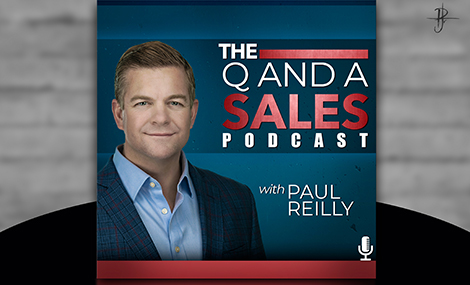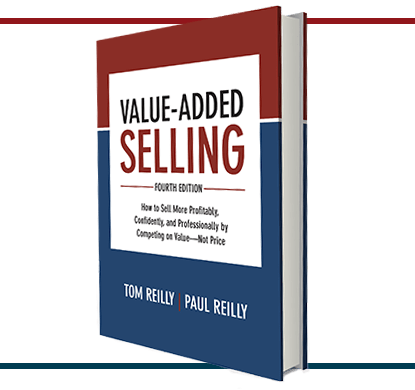In this podcast and the subsequent two episodes, Paul looks to inspire you to go out and find opportunities and thrive as we go through this downturn.
Show Notes
A negative attitude towards a recession can obscure your view from the more positive outcomes you can generate.
During a downturn, your customers are looking for cost-cutting measures. This is actually an opportunity masquerading as an objection.
Recessions will ease competitive pressure.
Economic downturn gives you greater access to higher-level decision makers. How so, Paul? Tune in to find out.
Did you enjoy the podcast? Go to Apple Podcasts to rate/review the podcast: https://podcasts.apple.com/us/podcast/the-q-and-a-sales-podcast/id1485103513. Click “Listen” then the “ratings and reviews” button.
Visit www.ToughTimer.com to get started on the 30-Day Tough-Timer Challenge!
Order your copy of Selling Through Tough Times from Amazon or Barnes & Noble!
Click here to purchase the latest edition of Value-Added Selling!
***
Thank you for tuning in. Our show is updated weekly with the questions you ask. So, please go to the home page to ask the question that you want answered.
Thank you to our production team at The Creative Impostor Studios.
Be sure to follow our show in your favorite podcast app and share this episode with a colleague or friend.
And most importantly…make it a big day.
What are the benefits of a recession? Part One
So, for today’s episode, and the next three episodes, we’re going to focus on an interesting topic, and that is, “What are the benefits of a recession?” And I know when we hear that term recession or slow down or downturn, whatever euphemism we want to use, you hear that term recession, and it triggers a certain emotion.
For some, it’s fear, anxiety, frustration. Whatever it may be, we’ve got to realize that a negative attitude towards a recession can obscure our view from the more positive outcomes that we can generate. So, with that being said, we are going to focus on the benefits of recessions. And my hope is, that after listening to this next three-part series, you are more inspired to go out there and find opportunities, create opportunities, and thrive as we go through this downturn.
Many of the opportunities that I’m going to share with you are also provided in the new book, Selling Through Tough Times. This is your go-to guide. This is the original book on how to thrive during a downturn, both mentally and financially. So make sure you pick up your copy. In Selling Through Tough Times, I actually share 20 examples of how you can help cut costs for your customers during tough times. That’s one of the things we’re going to talk about in today’s session. So pick up your copy of Selling Through Tough Times. It’s available wherever you get your books.
On this episode, we’re going to focus on three topics—three ideas that really show you that recessions can be a good. So the first piece we’re going to talk about is cost cutting measures. Here’s what we know. During a recessionary time or during a downturn, your customers and prospects are looking for cost-cutting measures. This is an opportunity masquerading as an objection.
Oftentimes, we’ll be putting together a proposal, you’re going to meet with prospects and they’re telling you, “Hey, we’re just looking to cut costs,” or “We’re going to hit pause in this project,” or “We just don’t have the money in the budget right now. We’re looking to cut costs.” This is one of your greatest opportunities. For most of you listening to this podcast, your solution has an outcome that focuses on reducing costs in some way, somehow. Think about it. Cost is more than just price. Cost is everything that your buyers are sacrificing. So you’ve got to ask yourself this question, “Okay, how does my solution help reduce overall maintenance costs? How does my solution help reduce labor cost? How do we help reduce engineering cost? How can we help reduce material…reduce waste, reduce energy costs.” The list goes on and on. In fact, as I mentioned in my new book, Selling Through Tough Times, I offer you 20 ways to help reduce your customer’s overall cost. In my book, I give you a step-by-step approach to quantify the impact of your solution.
Now, here’s one thought. When you are identifying all the ways that you help reduce your customer’s overall cost, you can’t just focus on time savings. And here is why I say that. During a downturn, many customers have more time, right? Business is starting to slow down for them to some degree, which means they have more time, they have more resources. So, saving time is still a very strong value proposition. But during tough times, we can’t just rely on time savings, we need to also focus on hard costs. And that can include extending the life of your equipment. It can include reducing energy costs, any number of that. Again, in the book, I’m giving you 20 suggestions on how you can reduce that overall cost. Okay? So that is critical. And one thing I would do is use this language; use this phrase to help open up more doors:
“Mr. Customer, the current recession has likely prompted cost-cutting measures within your company. Let’s get together and talk about some ways we can help you in that effort.”
That messaging is a great way to initiate contact with some of your prospects, some of your customers, especially those who have maybe hit the pause button, right? We’re hitting a key point with them. We’re triggering a response by focusing on those cost-cutting measures. So again, recessions are good because they open up cost-cutting opportunities for you.
The next reason that recessions are good, recessions will ease competitive pressure. Recessions will ease competitive pressure. This is the reality of tough times. During a recession and during tough times, some of your competitors will go out of business or some of your competitors will struggle mightily. Now think about what happens. During tough times, business slows down, some of your low-cost, cheap competitors, they tend to suffer because they’re not generating as much revenue. And as they generate less revenue, they have fewer resources to serve their existing customers. And as their service level continues to decline, they eventually are either going to go bankrupt or they’re going to suffer or they’re going to fail miserably.
Now I’m not rooting for anyone to fail, but I think it’s important to realize that during tough times, that’s going to ease some of that competitive pressure. These tough times will expose some of the weaknesses that these cheap, no-good competitors have been able to cover up in the mask of a good economy. And as they struggle, they’re going to lose opportunities, they’re going to lose customers. And so, this creates an opportunity for you. This creates an opportunity for you. And I know it sounds incredibly cold, but right now, you should be targeting your weak competitors. All of those competitors out there that you know are going to struggle over the next 3, 6, 12 months, you need to be there supporting their customer base. Position yourself to step right in and be the safety net as these cheap competitors struggle. So again, recessions, they’re a good thing because it will ease competitive pressure, and also, it gives you an opportunity to grow your business by targeting those weaker competitors.
The third reason why recessions are good is because recessions will give you access to higher-level decision makers. Here’s what happens during tough times. Your customers have certain spending limits. The decision makers that you’re interacting with—. Oftentimes companies will put higher-level approvals, during tough times, on regular expenditures. They’re doing this because they want to control cost as best they can. As more people are involved in the decision-making process, it gives you an opportunity to meet with some of those higher-level folks because they’re going to be part of the decision—especially when it’s a big decision.
Now, another reason high-level decision makers are getting involved is because they want to gather information. Think about this. Executives, high-level leaders, they’re making decisions in a cloud of uncertainty. They’re not sure what’s going on, so they want to get as much information as they can, which means they’re going to meet with more people. They’re going to get heavily involved in the decision-making process. This also creates an opportunity for you to engage at a higher level. It provides you with an opportunity to bring your high-level decision makers in to meet your prospects high-level decision makers. In fact, we call that the high-level schmooze, and we’ve talked about it on this show before. But during these tough times, this is critical.
In fact, I had a call just the other day with a high-level executive. We were talking about what the next 3, 6, 9 months or 12 months is going to look like. I said to him, I go, “You know what? I’ve got a couple other meetings later today from folks that are tied to your industry. If I find some interesting insights, why don’t I connect all of you together so you can have a conference call? Just get a chance for all of you to discuss what you’re seeing, share trends, share ideas.”
And the executive lit up when I mentioned that. And it’s because, during tough times, executives and high-level folks, they’re looking for information. And if you can be the individual to help coordinate that information sharing, if you can arrange high-level meetings, you are creating value. And the high-level decision maker is going to remember this. Remember, high-level decision makers buy partnerships, and they’re looking at you and your solution and your company and your leadership team, and they’re asking fundamentally, “All right, are these good businesspeople? Do I want to do business with them?” And if you’re able to prove that, if you’re able to show that, you are creating value.
So again, gosh, tough times are good. Tough times create opportunities. As I mentioned before, they are a good thing because remember, number one, recessions create cost-cutting opportunities. Number two, recessions will ease that competitive pressure. And third, recessions will lead to greater access to high-level decision makers.
All right, folks. So just a reminder, make sure you pick up your copy of Selling Through Tough Times. In the book, I provide so much detail. It’s your playbook on how to be successful during this downturn. Pick up your copy. You do not want to miss this opportunity. You don’t want to look back at this time a year from now and say, “I wish I would’ve read the book.” Pick up your copy.
Make it a big day.


